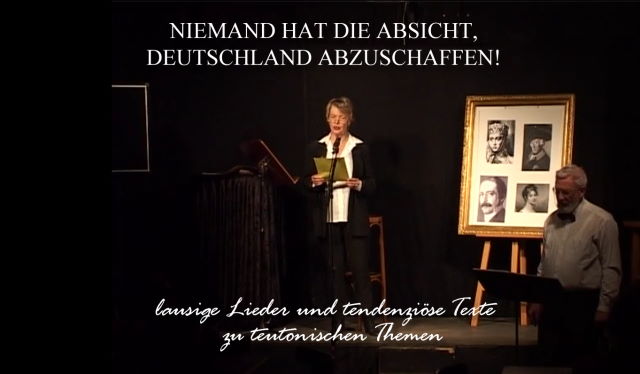To deliver an anti-fascist declaration in the sense of solely declaring oneself against fascism, without however declaring what fascism is, would be an idle endeavour in the manner of current FRG ideology that attempts to deduce its legitimacy by demonising its historical predecessors. Furthermore, this would increase the fascination of fascism, one which it is evidently gaining with the collapsing parliamentary democracies of the West Bloc. In the expectation that the old slogan of the 1968 seizure of the word: “Capitalism leads to Fascism, Capitalism must go!” will soon again become topical, the Deutsches Kolleg feels induced to deliver the only credible declaration against fascism, by declaring what fascism is.
Just as all revolutions provoke counter-revolutions, so too the Peoples visited by the Capitalist Revolution reacted with counter-revolutionary movements, as in France, Italy, Spain, Portugal, Argentina, Russia and other places. In Germany, as Europe’s highest developed country and Inner Realm, this took place the earliest and on a philosophical height: the groundbreaking thinkers here were Schopenhauer, Nietzsche and Heidegger, and in the period between the two World Wars the heads of the Conservative (Counter-)Revolution, all of whom were naturalia philosophers whose image of humanity evoked a pessimistic ethic of either compassion for human weakness, or glorification of human strength, and whose pre-political thought concentrated on the naturalias of world, will, force and power. Therewith was laid the philosophical foundation of a counter-revolution of thought and action. Counter-revolutions are reversals of essential circumstances within the commonweals to such an extent that old, more primitive circumstances become essentially determinant. Fascism was such a counter-revolution.
In the German Reich, however, fascism was practically unable to make a move, except in the Catholic lands which in the early 19th century had endured the marching-through of liberalism. Germany proved herself as resistant against fascism as previously against liberalism. Germany experienced folkish-national socialism, which had befouled itself in counter-revolutionary fashion due to Hitler’s alliance with fascist Italy. Through its folkish-national revolutionary fundamental orientation, as well as through the German Workers’ Front (DAF) and Reich Labour Service (RAD), the German Reich had, however, in essence achieved the anti-Capitalist Revolution.
20th century fascism found its classic manifestation in Italy. It was Roman dictatorship, but not oriental despotism. As such it proved itself to be an anti-Capitalist counter-revolution of the character of classical antiquity: a tomb of the Peoples and an exaggeration of the state to an empire. Mussolini’s fascism was not based on the folkish principle because the inhabitants of the Apennine Peninsula have, owing to the imperial import of foreign labour force, not been a People since the age of the Roman emperors; and in the 19th century there was no resurrection of an Italic People.
In the case of a state emergency, dictatorship is unavoidable in states organised as a republic, and is constitutionally provided for. The constitutional monarchy – as a form of state – does not require a provision for dictatorship so long as the leader of the government is not instituted by the parliamentary majority, but by the monarch. The fact that the Hitler government took the shape of a dictatorship in Germany, was due to the fact that the victorious powers of the First World War had enforced the republican form of state according to the Weimar Reich Constitution under violation of the ius gentium. Further serious blame for the dictatorial form of the Hitler government was shared by the parliamentary democrats of the Weimar Republic who had co-decided the emergency article of the enforced Reich Constitution, and who had themselves previously used it as dictatorial mandate on a number of occasions. Hitler did not consider himself an anti-democrat, but correctly an opponent of the parliamentary form of government and a direct democratic leader of the People. The only German capable of following him in this role in post-war Germany would have been Rudi Dutschke.
Fascism was the antique counter-revolution, Communism the Asiatic counter-revolution against Capitalism in the 20th century. Mussolini consequently appeared as a Roman dictator, and Stalin equally consequently as an oriental despot. In Italy, Mussolini worked through his proscription lists and began re-conquering the provinces of the Imperium Romanum. In Russia, Stalin introduced the central administration economy, much like an Egyptian pharaoh except on the basis of original industrial accumulation of capital. Both systems of rule were not progressive passages to something historically higher, but setbacks – historical breathing pauses, or deliria. Hegel noted: In oriental despotism one is free (the despot), in classical antiquity some are free (eupatrids, patricians, etc.).
German thinkers such as Kant, Fichte, Hegel and Dutschke are, owing to their historical progressivism, not interested in historical counter-revolutions. They are also theoretically and systematically immunised against subsiding into fascism due to the fact that they systematically base their philosophy of the objective spirit on the concept of Right. The Deutsches Kolleg carries this tradition forward, and thinks the organism of the People not naturalistically, but as a person and thus also thinks the state as nation – but not as a formal nation (will nation) but as a real nation (nation state): as sovereign community of extraction, language and destiny, not as society.
The Constitution of the real nation state describes the folk-community as an organism. By these means the constitution is at first an actual, substantive constitution. It combines – not to a person, but to a possessor – the actual collaboration of the working elements of the community of possessors of all national comrades to the animated apparatus of public authority that seeks the communal goals. The easier and more powerful it can act as a community, the more reminiscent it is of an animal organism (such as a powerful predator like a lion or an eagle – the favoured symbols of the state organism organised by the political union of all national comrades) the better is its condition. This does not yet touch upon the question of the form of intercourse, i.e. the form of Right, which makes the public authority to a concrete general subject of Right and thus to a state.
For its self-conception and self-portrayal, the state as objective spirit not only has the ideas of life, cognition and action as well as the absolute idea to its disposal, but also the natural philosophical determinations of the animal organism – the individual with its disease and its death. It is therefore not possible to describe the state as a naturalia, i.e. as a constitution, without the concept of the organism. Nietzsche and all naturalia philosophers after Hegel have described the state as the coldest of all monsters, as life élan, as the strong against everything weak, as the superman, and the like. The humanistic image of humanity too, can only conceive the state naturalistically, as human organism, just like the racist image of humanity. Racism, however, is more differentiated than humanism, because it at least allows for the elementary differences within humanity.
Hegel and Hitler remain incomprehensible so long as one does not differentiate between Hegel’s political image of humanity and Hitler’s naturalistic image of humanity, i.e. between form of intercourse and naturalia, and so long as one does not establish their unity within the form of Right. And to equate historical German National Socialism with Italian Fascism, as is the current norm, totally obstructs the view onto the logic of history. The Deutsches Kolleg condemns once and for all this whole current infinitely vacuous waffle about fascism and society that is incapable of differentiating fascism from National Socialism and cannot differentiate society from community. And fascism the Deutsches Kolleg condemns anyhow!











